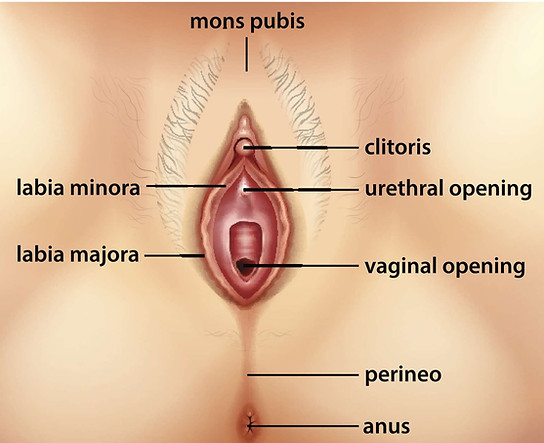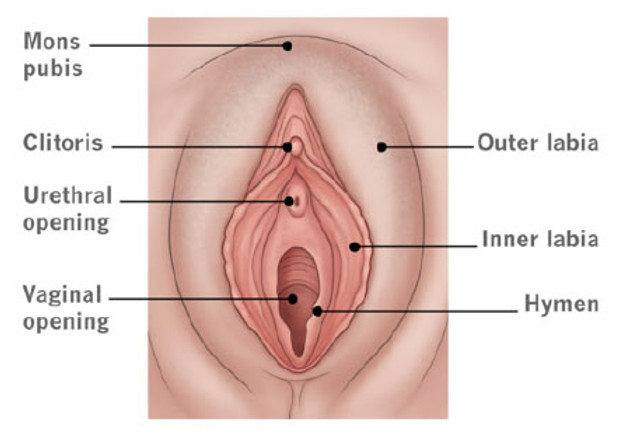The Vulva and Vagina are part of the female reproductive organs.
The Vulva lies externally and on which pubic hair grows. The main parts of the Vulva include the Labia Majora, Labia Minora, and Clitoris. The Labia and the Clitoris function mainly as organs of sexual pleasure.
Parts of the Vulva include:
Mons Pubis: The top area of the vulva that majorly has hair follicles.
- Labia majora: They are the large lips, and they protect the other external reproductive organs.
- Labia minora: They are the small lips and are located just inside the Labia majora. They surround the openings to the Vagina.
- Clitoris: It is a small, sensitive protrusion that is like the penis in males. A fold of skin covers the Clitoris, and like the penis, the Clitoris is very sensitive to stimulation and can become erect. The two labia minora meet at the clitoris (figure 1).

Figure 1: Structure of the Vulva(1)
The Vagina lies internally and acts as a passageway between the Vulva to the Cervix (the lower part of the uterus). The Vagina functions as an organ of sexual pleasure and the birth passageway. It also allows sperm cells to enter and menstrual blood to exit (figure 2).

Figure 2: Structure of the Vagina(2)
What is Vaginal Health?
Normal vaginal secretions keep the Vagina moist and help to protect against damage or infection. It is normal to have a different amount of vaginal discharge that is white or clear. This can increase or decrease at certain times depending on your monthly cycle, whether you are pregnant or sexually aroused, or ‘turned on’.
Some things, however, can disrupt this normal, healthy balance.
Common causes of irritation include antibiotics, clothing, over-washing, or the use of strong soaps, fabric softeners, shower gels, or vaginal deodorants. Irritation and any change in vaginal discharge could mean something is wrong.
These changes may be:
- More discharge than usual.
- An unpleasant smell, often worse after sex.
- A change in the colour of the discharge.
- Sore, itchy skin around the genital area.
- Discomfort when passing urine.
- A rash or tiny cuts in the genital area.
If you notice any of the symptoms, visit a doctor.
What conditions can affect the Vagina?
Several different conditions can occur in the Vagina.
- Sexually transmitted infections (STIs), such as chlamydia and trichomonas vaginalis (TV or ‘trichs’), can also cause a heavier discharge than usual, so it is important to get any change in discharge checked out if you think you might have an STIs.
- Two of the most common are candidiasis (thrush) and bacterial vaginosis (BV) – these infections are NOT sexually transmitted.
There are several things you can do to help reduce the likelihood of thrush/BV:
- Avoid wearing tights, nylon underwear, or tight trousers or jeans frequently.
- Avoid using soaps to wash the vagina, use them on the vulva ONLY.
- Do not use vaginal deodorants and disinfectants.
How to gain good Vaginal health and wellbeing
- Do not use alcohol/baby wipes on your genital skin.
- After going to the toilet, always wipe from the front to the back to avoid transferring germs to the Vagina.
- If you develop thrush when you use antibiotics, see your doctor to prescribe treatment for thrush simultaneously.
Written and reviewed by
Dr Elizabeth Ejagwulu (MBBS, GMC-GPST1)
Dr MaryJane Nweje (MBBS, MSc)
Sources:
- blueringmedia / Getty Images
- https://www.echoclinics.nhs.uk/womens-health/anatomy/
- https://my.clevelandclinic.org/health/articles/9118-female-reproductive-system

